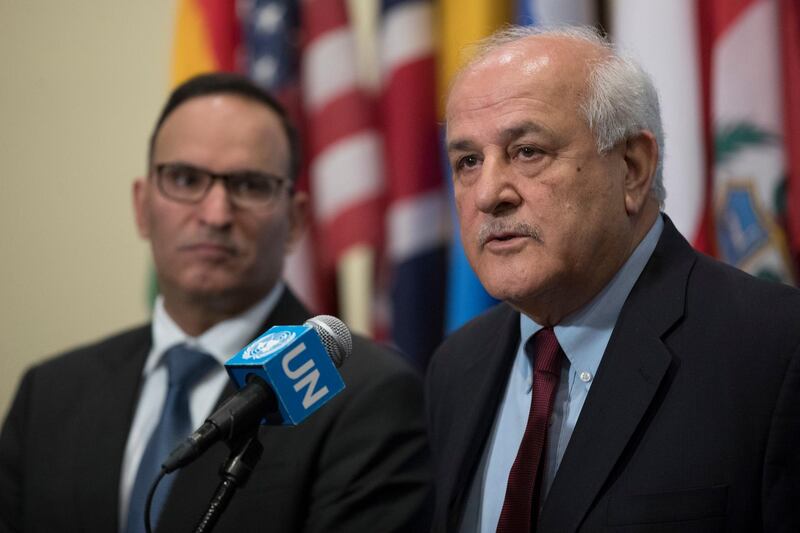The Palestinians are to head the biggest bloc of developing nations at the United Nations after its members selected the observer state to replace Egypt as its next leader.
The decision to put them in charge of the Group of 77 could exacerbate tensions with the administration of US President Donald Trump and Israel, who have both railed against the Palestinians at the global body.
The bloc was originally founded in 1964 with just 77 states but it now boasts 135 members and accounts for four-fifths of the world’s population.
Egypt will hold the presidency of the group until December 31, when the Palestinians will take over.
Israeli Ambassador to the UN Danny Danon condemned the move as one that would encourage the Palestinians “to not engage in negotiations for peace”.
Experts say that the leadership could help the Palestinians to grow its diplomatic standing and international clout on issues separate to the peace process, as countries such as Guatemala and Paraguay will remain on the side of American and Israeli positions at the global body.
“To me the more intriguing question is whether Palestine uses its position to advance issues that matter to the group as a whole,” says Hugh Lovatt, Middle East and North Africa policy fellow at the European Council of Foreign Relations (ECFR), citing areas such as economic development, poverty eradication and sustainable resources.
“This is something that Israel has done quite successfully with some African members of the Group, allowing it to make significant economic and diplomatic inroads in Africa.”
______________
Read more
UN General Assembly blames Israel for Gaza violence
UN inquiry approved into killing of Palestinians at Gaza fence
Arab League demands international probe into Israeli crimes
______________
The choice of Palestine as leader of the group is another victory in the Palestinians’ bid for greater legitimacy at the international level. It is an observer state at the UN, on par with the Vatican, but its hopes of a sovereign state remain elusive.
Israel and the US maintain that any solution to the decades-long conflict must be solved bilaterally. Both opposed the creation of the Palestinian observer mission at the UN.
The Trump administration has cut hundreds of millions in aid for the UN agency that focuses on Palestinian refugees in a retaliatory move against Palestinian refusal to engage in negotiations after the US announced the relocation of its embassy to Jerusalem.
On Wednesday, UNWRA announced that it was cutting more than 250 jobs in the West Bank and Gaza after the cuts.
In total, 154 employees in the occupied West Bank and 113 in the Gaza Strip will be let go, UNRWA spokesman Chris Gunness said in a statement.
More than 500 other full-time staff will be offered part-time contracts, the statement added.
The job cuts were the first since the US announced it would only provide the agency with $60 million this year, down from $360 million the previous year.
Mr Gunness's statement said the US cut represented an "existential threat" to UNRWA, which had been trying to raise the money from other donors.
Amal Al Batsh, deputy head of UNRWA's staff union, condemned the cuts.
"The decisions are unfair and will adversely affect employees and their families," she told AFP.
Hundreds of people rallied outside UNRWA's headquarters in Gaza City to protest against the decision to axe jobs, as the union called for a sit-in.





